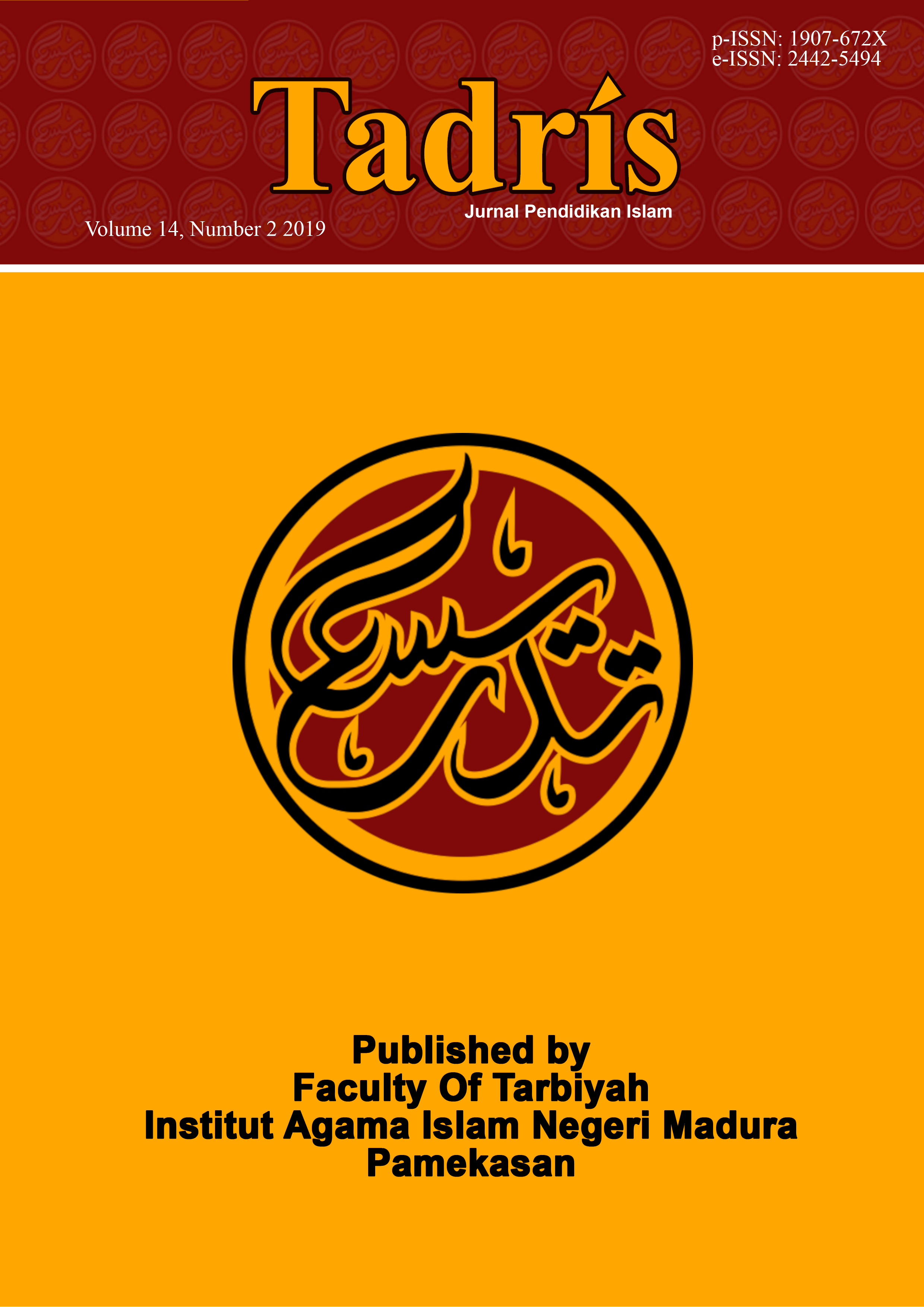Konsep Model “Empowerment Learning” Pada Pendidikan Tinggi Keislaman Dalam Perspektif Pedagogik Kritis
 Abstract views: 338
,
Abstract views: 338
,
 PDF downloads: 407
PDF downloads: 407
Abstract
This article attempts to initiate the change of learning models that occur in the Islamic educational environment. By initiating the model of learning-oriented in order to improve the capacity of graduates who are able to apply the scientific fields of Islamic studies in daily life in accordance with the demands and changes in the model of social life by mastering the religious dogmas becomes a source of value that can be applied in solving problems of mental spiritual life of the society. The dynamics of changes that occur in Indonesian Islamic society are influenced by the success of educational change Islamic Higher Education is one of the strategic elements that massively try to make the process of change through the determined educational program. Trough the process of learning, it that can provide the space of thinking, and the space of understanding for each individual who learns to critically resolve the phenomena of life to a constructive lifestyle with a spiritual foundation.
Keywords: empowerment learning, PTKI, critical pedagogy
Downloads
References
Agus Nuryanto, “Isu-Isu Kritis dalam Pendidikan Islam: Perspektif Pedagogi Kritis”, [Jurnal Kependidikan Islam, Volume 4 Nomor 1 Januari – Juni 2009], hlm.107-125
Catherine F. Brooks and Stacy L. Young,” Are Choice-Making Opportunities Needed in the Classroom?Using Self- Determination Theory to Consider Student Motivation and Learner Empowerment”,[International Journal of Teaching and Learning in Higher Education, Vol. 23 Nomor 1, Tahun 2011], hlm. 48-59.
Jenniver Snelling,”How to Empower Student Voice in the ISTE” [magazine entrsekt disediakan: www.iste.org/explore/entrekt:id=13]
John Loard and Peggy, The Process of Empowerment: Implication for Theory and Practice,[Canadian Journal Of Mental Healt, 12: Spring 2003], hlm. 5-22.
Joni Rahmat Pramudia, “Orientasi Baru Pendidikan: Perlunya Reorientasi Posisi Pendidikan dan Peserta Didik”, [Jurnal Pendidikan Luar Sekolah Vol.3 No. 1 Nopember 2006], hlm. 29-35.
Julian Rappaport,” Terms of Empowerment/Exemplars of Prevention: Toward a Theory for Community Psychology,”, [American Journal of Community Psychology, Vol. 15, No. 2, 1987], hlm. 122-148.
M. Yunus Abubakar, “Problematika Pendidikan Islam di Indonesia”,[DIRASAT Jurnal Manajemen & Pendidikan Islam Vol 1 Nomor 1 Juli-Desember 2015], hlm. 99-123.
M. Yunus Abubakar, “Problematika Pendidikan Islam Indonesia”,[Jurnal Dirasat Volume 1 No. 1 Juli-Desember 2015], hlm. 99-122.
Mokhtar Bukhori, Pedagogik Kritis, [disediakan https://www.google.co.id/search?q=artikel+journal%2Bpedagogik+kritis] diunduh 17 Januari 2013 jam 13.06 wib, hlm. 3
Nurul Afifah, “Problematikan Pendidikan di Indonesia: Telaah dari Aspek Pembelajaran” [Jurnal Elementary, Vol. 15 Edisi 1 Januari 2015], hlm. 41-47.
Paulo Freire, Pedagogy Of Freedom: Ethics, Democracy, and Civic Courage, [Bookfi.org],
Peter Jarvis, Paradoxes of Learning: On Becoming an Individual in Society, (Sanfrancisco: Jossey-Bass Publisher), 1992
Robert M. Smith, Learning How to Learn: Applied Theory for Adult, (Chicago Illionis: Follett Publishing Company), 1982.
Rosidin, “Problematika Pendidikan Islam dalam Perspektif Maqȃsid Syarȋ’ah”.[Maraji Jurnal Studi Keislaman Volume 3 Nomor 1 Septeber 2016], hlm. 185-210.
Saiful Hadi, “Kurikulum Manajemen Pendidikan Islam Progressive Empoweristic:Pemikiran Kearah Mutu Lulusan Yang Kreatif Berdaya Saing”[Artikel/Proseding Seminar Nasional Mengembangkan Kurikulum Manajemen Pendidikan Islam Berbasis SNPT- Ber KKNI, (Makasar: Jurusan MPI FTIK UIN Alauddin, 2015), hlm. 44.
Sarah Elizabeth Barrett, “The Hidden Curriculum of Teacher Induction Program:Ontario Teacher Educators’ Perspective”.[Canadian Journal of Education, 32, 4, Tahun 2009] hlm. 677-702
Stanlay F. Steiner et al., Frerian Pegagogy, Praxie, and Pssibilities: Project for New Millenium, (New York&London: Falmer Press A member of The Tailor & Francis Group), 2000
Stevens A. Schapiro,”From Andragogy to Collaborative Critical Pedagogy:Learning for Academic, Personal and Sosial Empowerment in A Distance Learning Ph.D Program”,[Journal of Tranformative Education, Vol. 1 Nomor 3 April 2003], hlm. 150-166
Copyright (c) 2019 TADRIS: Jurnal Pendidikan Islam

This work is licensed under a Creative Commons Attribution-NonCommercial 4.0 International License.
The journal operates an Open Access policy under a Creative Commons Non-Commercial 4.0 International license. Authors who publish with this journal agree to the following terms:
- Authors retain copyright and grant the journal right of first publication with the work simultaneously licensed under a
 Commons Attribution-NonCommercial 4.0 International License
Commons Attribution-NonCommercial 4.0 International Licensethat allows others to share — copy and redistribute the material in any medium or format, and adapt — remix, transform, and build upon the material.
- Authors are able to enter into separate, additional contractual arrangements for the non-exclusive distribution of the journal's published version of the work (e.g., post it to an institutional repository or publish it in a book), with an acknowledgement of its initial publication in this journal.
- Authors are permitted and encouraged to post their work online (e.g., in institutional repositories or on their website) prior to and during the submission process, as it can lead to productive exchanges, as well as earlier and greater citation of published work (see The Effect of Open Access).














